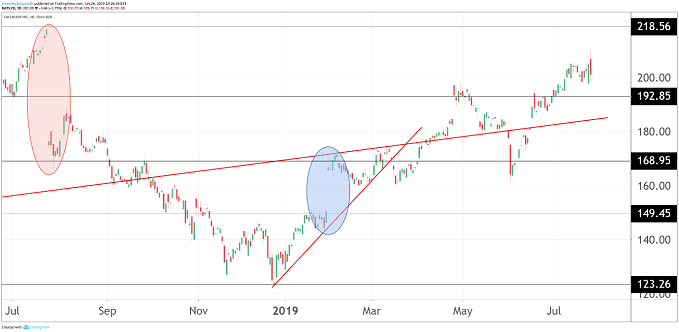Stockwatch: Time to downgrade this high-profile tech play
Quarterly results affirm a quality international growth stock, but there is reason to be cautious now.
26th July 2019 10:36
by Edmond Jackson from interactive investor
Quarterly results affirm a quality international growth stock, but there is reason to be cautious now.

Social media behemoth Facebook (NASDAQ:FB) and its shares have progressed since I drew attention as a 'long-term buy' in April at $193, also noting a "high beta", meaning its share price is typically more volatile than the market.
The stock reached $205 in a positive reaction to the second-quarter 2019 results, capitalising the group at $580 billion (£466 billion), before falling 2% to $201 last Thursday as the wider market fell 0.6%.
This may be a simple case of investors seizing on whatever fresh news there is, but with US stocks well-elevated – Facebook trades on an historic price/earnings (PE) ratio of around 30 times – it's pertinent how a bellwether tech-stock like this edged up in response to its story then fell more abruptly amid rumours the European Central Bank is preparing to cut interest rates.
Do you recall the adage how "the bull goes up in the lift and the bear, out the window?" I exaggerate to make the point, versus modest short-term volatility, but it reflects the state of this market. Sentiment appears quite unstable between lower interest rates being good for the market, albeit negative too if they reinforce a sense of global slowdown.
The upshot for a stock like this is yes, its narrative and results are capable of resisting downturn – as advertising continues to shift to social media – but you also have to mind how a growth rating is exposed to significant market moves.
That said, if the macro scenario is lower growth and interest rate cuts, it ought to be positive for growth stocks as investors face fewer decent choices. Time will tell how these contradictions resolve themselves.

Source: TradingView Past performance is not a guide to future performance
Latest results bolster the investment rationale
Performance-wise there are some slight beats to expectations: $16.9 billion revenue versus consensus for $16.5 billion; and earnings per share (EPS) of $1.99 versus $1.88 consensus. Obviously, it's a short timescale and could reflect cautious guidance, but the key driver is advertising revenue soaring 28% year-on-year with strong growth across all regions, which affirms Facebook's business model.
Mobile ad revenue is also 94% of the total, tuned into the social trend. Ad products are being improved to offer more value to clients via "dynamic ads" showing people items they've previously browsed on a retailer's website or app. (My sense however is this keeping pace with Google when web-browsing: ads typically recycling the last items.) "GoAds" now also refresh them while people scroll through their Facebook/Instagram feed (quite how effective that will prove unless you look back?).
At least Facebook shows vigorous innovation and there's financial proof of how advertising is coming its way. Any slowing in that trend is liable to check the stock’s rise, given its rating and lack of dividend, but social media appears to be consolidating its grip on people's attention.
Facebook's daily active users are up 8% year-on-year led by growth in India, Indonesia and the Philippines – representing 66% of the 2.4 billion active users in June. So even if Facebook/Instagram no longer appear most fashionable in the West, Asia Pacific momentum could build further.
Cash reserves were $48.60 billion at end-June, reflecting strength of cash generation despite capital spending - $3.78 billion in the latest quarter.
As and when cracks eventually appear in the growth stock rationale, it is possible that Facebook will have matured into a cash cow enough that if its board doesn't make meaningful payouts, then activist investors will demand them.
Meanwhile, I should note that 2019 will see margins ease as expenses grow, and they are being guided more in line with revenue growth for 2020.
Overall, and with WhatsApp and Messanger also part of the Facebook family, such an advertising market - of over 2.1 billion people using at least one such media daily – looks well-established so long as management deals capably with security/privacy issues that are now in regulatory focus.
| Facebook Inc: second quarter 2019 | |||
|---|---|---|---|
| Financial highlights | |||
| $ millions | Three months ended 30 June | Yr-on-Yr | |
| 2019 | 2018 | % change | |
| Advertising | 16,624 | 13,038 | 28% |
| Other fees | 262 | 193 | 36% |
| Total revenue | 16,886 | 13,231 | 28% |
| Costs & expenses | -12,260 | -7,368 | 66% |
| Operating profit | 4,626 | 5,863 | -21% |
| Operating margin | 27% | 44% | -39% |
| Taxation | 2,216 | -757 | 393% |
| Tax rate | 46 | 13 | 254% |
| Net income | 2,616 | 5,106 | -49% |
| Diluted EPS ($) | 0.91 | 1.74 | -48% |
Source: Company REFS
Vigorous responses to the privacy scandal
In April, I suggested the privacy scandal that erupted in early 2018, when Cambridge Analytica obtained personal data from Facebook profiles, used for political purposes – was a "wall of worry" situation the stock could climb, given management was likely to respond vigorously to such an existential threat.
If people distrust Facebook, then it would quickly become toxic with advertisers. Personally, I don't see this as having any effect on Facebook users: if people still want to tune in and promote their pictures/opinions then they are doing so. If anyone's easing off usage, then they weren’t such a major fan of social media anyway.
Facebook's paying a $5 billion fine to the US Federal Trade Commission, coinciding with the second-quarter results, is being presented by rival media as "unprecedented", and yet last springtime Google had accumulated $9.4 billion fines to the EU, more than it's paying in taxes. Relative to these modern media giant's cash generation however, it’s a frictional cost. Facebook's latest results reflect $2 billion paid and which isn't tax deductible.
Quarterly reviews of data privacy and its auditing have been instigated, with more controls on developers accessing data through the Facebook platform.
A new privacy committee of the board is being set up, with a chief privacy officer to work with an independent privacy auditor.
Regulation remains in focus, and big US tech stocks fell earlier this week after the Justice Department declared an antitrust review into whether dominant firms have unlawfully stifled competition. Tech company executives recently testified to Congress about their policies/practices and met strong criticism – Facebook specifically over the scope and breadth of its operations.
Many Senators feel Facebook lacks adequate protection of privacy and personal data. Personally, I think it's a typical example how the public policy response is behind the curve when shortcomings happen in business. Yes, Facebook has had its lapses, but management is keenly attuned.
The CEO says:
"Our goal is to build privacy protections that are as strong as the best services we provide."
Facebook has also published a third transparency report on dealing with harmful content like hate speech and violence, with bullying and harassment also now targeted. "We're going to publish these reports quarterly so people can hold us accountable..."Facebook says. While to some extent this keeps negatives in focus, I think in terms of "trust", users will conclude the company is doing its best. You can't eliminate all undesirable aspects of behaviour without making the environment feeling over-controlled.
The proposed Libra cryptocurrency is however dubious
I'm dubious about Facebook's proposed Libra cryptocurrency for 2020, although that significantly reflects my view on crypto's overall. Polling in June reflected indifference, perhaps partly because it coincided with questions on trust surrounding personal data – where 77% of 1,800 US adults surveyed did not trust Facebook.
But this in the US where the privacy issue is currently high-profile. I think it will pass. The plan is for the Libra token to be backed by financial assets such as a basket of currencies and US Treasury securities, to stem volatility.
Facebook is trying to be with the times and yet I feel Libra risks reinforcing an image for controversy.
Mainstream consumers, central banks and regulators are sceptical, and the kind of rebels using crypto seem more likely to regard Facebook as symptomatic of the Wall Street Establishment they seek to avoid.
So quite how successful Libra can prove is an unknown.
I'm adjusting my stance currently from 'long-term buy', chiefly because I'm concerned at the overall US earnings outlook and its potential to weigh on the more highly-rated stocks. Hold.
Edmond Jackson is a freelance contributor and not a direct employee of interactive investor.
These articles are provided for information purposes only. Occasionally, an opinion about whether to buy or sell a specific investment may be provided by third parties. The content is not intended to be a personal recommendation to buy or sell any financial instrument or product, or to adopt any investment strategy as it is not provided based on an assessment of your investing knowledge and experience, your financial situation or your investment objectives. The value of your investments, and the income derived from them, may go down as well as up. You may not get back all the money that you invest. The investments referred to in this article may not be suitable for all investors, and if in doubt, an investor should seek advice from a qualified investment adviser.
Full performance can be found on the company or index summary page on the interactive investor website. Simply click on the company's or index name highlighted in the article.
Disclosure
We use a combination of fundamental and technical analysis in forming our view as to the valuation and prospects of an investment. Where relevant we have set out those particular matters we think are important in the above article, but further detail can be found here.
Please note that our article on this investment should not be considered to be a regular publication.
Details of all recommendations issued by ii during the previous 12-month period can be found here.
ii adheres to a strict code of conduct. Contributors may hold shares or have other interests in companies included in these portfolios, which could create a conflict of interests. Contributors intending to write about any financial instruments in which they have an interest are required to disclose such interest to ii and in the article itself. ii will at all times consider whether such interest impairs the objectivity of the recommendation.
In addition, individuals involved in the production of investment articles are subject to a personal account dealing restriction, which prevents them from placing a transaction in the specified instrument(s) for a period before and for five working days after such publication. This is to avoid personal interests conflicting with the interests of the recipients of those investment articles.